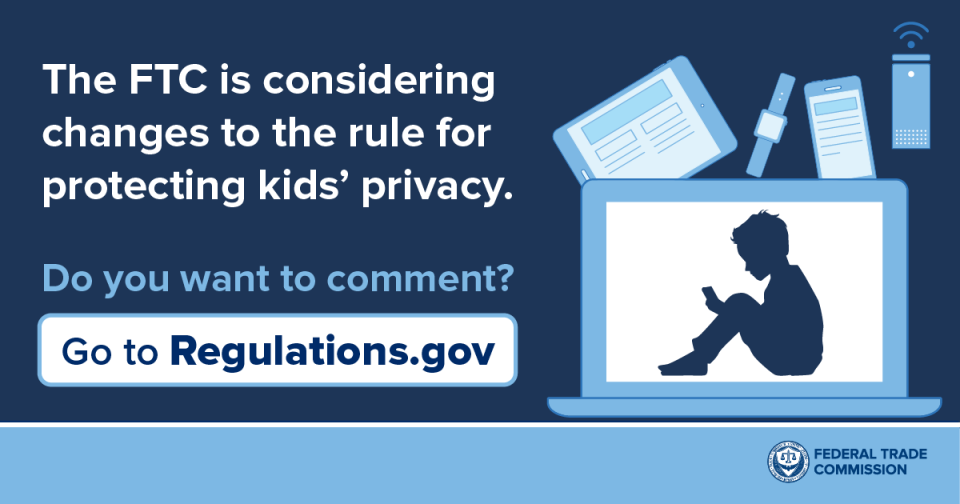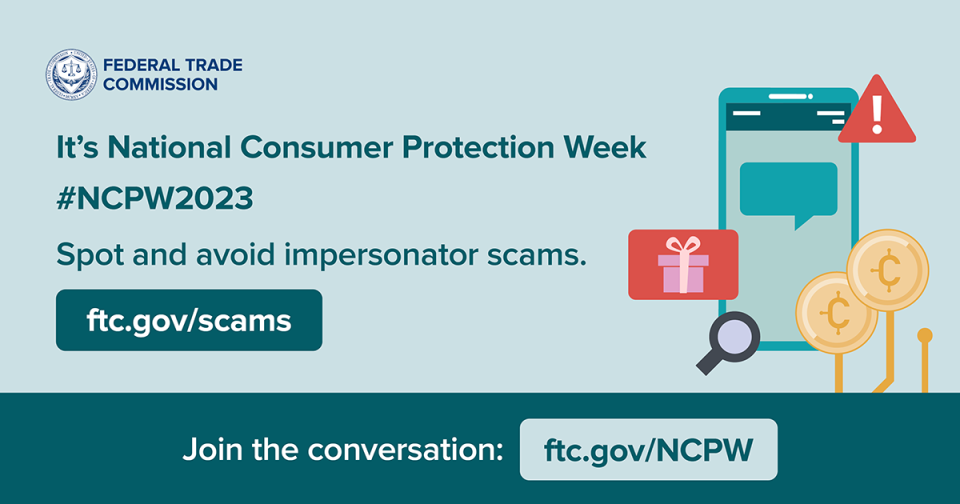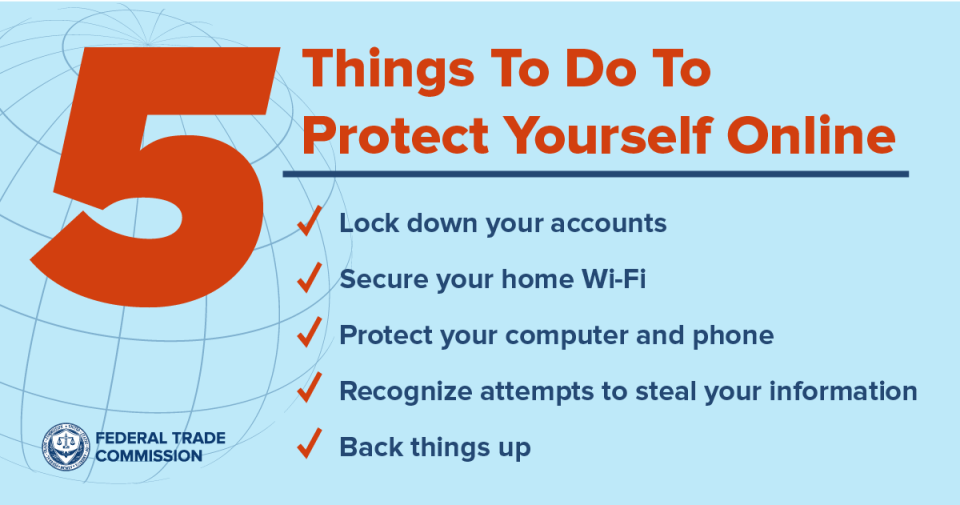Providing accurate and timely information about what matters in Franklin, MA since 2007. * Working in collaboration with Franklin TV and Radio (wfpr.fm) since October 2019 *
Friday, September 5, 2025
Thursday, October 10, 2024
Marriott data breach settlement: What it means for consumers
|
 |
| Marriott data breach settlement: What it means for consumers |
Sunday, August 25, 2024
FTC Reveals "Five ways to keep scammers and hackers away"
|
 |
| FTC Reveals "Five ways to keep scammers and hackers away" |
Saturday, February 17, 2024
FTC Proposes New Protections to Combat AI Impersonation of Individuals
Saturday, January 13, 2024
Children’s online privacy: Tell the FTC
|
 |
| Children’s online privacy: Tell the FTC |
Friday, March 17, 2023
Slam the Scam: Keep Your Personal Information
| ||||||||
| ||||||||
| | |||||||
| Join the millions and discover your benefits! |
Tuesday, March 7, 2023
During this National Consumer Protection Week, let’s talk about impersonation scams
 |
| During this National Consumer Protection Week, let’s talk about impersonation scams |
Sunday, February 5, 2023
Washington Post: On TikTok "is no more risky than Facebook. That’s not entirely a compliment"
"As calls to ban TikTok grow, should you quit the app?For the average user, TikTok is no more risky than Facebook. That’s not entirely a compliment.I’ve been hearing from Washington Post readers concerned that the Chinese-owned app is handing our data to the Communist Party. So I looked under the hood at what TikTok knows about us, and quizzed both the company and the senators calling on us to stop using it.So far, the arguments to ban TikTok are more rooted in fears than actual evidence. The best thing that could come of this scare is that Congress finally realizes we need privacy rules and guardrails for kids across all apps — not just the ones with Chinese owners."
Saturday, December 10, 2022
What did you consent to do? Use of social media tools getting riskier - links to 3 articles
"This week, millions came face to face with AI-generated versions of themselves thanks to the app Lensa, which uses machine learning to spit out illustrations based on photos you provide. People took to social media to reflect on how the portraits made them feel — and who stands to lose when AI art goes mainstream.“I think I have a fairly decent self-image, but I looked at the images and I was like, ‘Why do I look so good?’” said James, a Twitch streamer who declined to give his last name to keep his social media presence separate from his day job. “I think it shaved off a lot of my rough edges.”
"Sure, that drunk selfie you posted on Instagram might be personally embarrassing. Now imagine that selfie is also training fuel for an artificial intelligence system that helps put an innocent person in jail.Welcome to the age of artificial intelligence. What you do with your face, your home security videos, your words and the photos from your friend’s art show are not just about you. Almost entirely without your true consent, information that you post online or that is posted about you is being used to coach AI software. These technologies could let a stranger identify you on sight or generate custom art at your command."
"Tens of thousands of websites belonging to government agencies, Fortune 500 companies and other organizations host Twitter computer code that sends visitor information to the social media giant, according to research first reported by The Cybersecurity 202.And virtually none of them have used a Twitter feature to put restrictions on what the company can do with that data, said digital ad analysis firm Adalytics, which conducted the study.The presence of Twitter’s code — known as the Twitter advertising pixel — has grown more troublesome since Elon Musk purchased the platform."
- Don't fall to any one of the meme's (What Game of Thrones character are you?) or tools like Lensa
- Install DuckDuckGo (https://duckduckgo.com) on your browser to prevent the tracking cookies from doing their thing
 |
| Lensa interpretations of reporter Tatum Hunter. These images were created by AI. They were not taken by a camera. |
Wednesday, October 5, 2022
Five things to do to protect yourself online
|
Sunday, March 6, 2022
Kurbo by WW charged with collecting kids’ personal info without parents’ permission
|
Wednesday, December 29, 2021
Keep your personal information safe in the New Year
|
 |
| Keep your personal information safe in the New Year |
Monday, October 4, 2021
60 Minutes "a betrayal of democracy" leads to decision that Franklin Matters Facebook page to go away Dec 1, 2021
"The version of Facebook that exists today is tearing our societies apart and causing ethnic violence around the world," says former Facebook employee France Haugen. She points to Myanmar, where the military used Facebook to launch a genocide.
“The version of Facebook that exists today is tearing our societies apart and causing ethnic violence around the world,” says former Facebook employee France Haugen. She points to Myanmar, where the military used Facebook to launch a genocide. https://t.co/WU4IumjHkO pic.twitter.com/cy9Ed9MgbH
— 60 Minutes (@60Minutes) October 3, 2021
Note: this is a continuation of the revelations about Facebook since the Cambridge Analytica scandal. in 2018 I attempted to remove Franklin Matters updates from Facebook at that time and the readers, followers on Facebook created an uproar so I stayed reluctantly.
As a data security and privacy professional I can no longer condone the Facebook business model. Effective Dec 1, 2021 the Franklin Matters Facebook page will go away. You are given notice to find one of the other options to obtain the valuable information shared but not longer directly by me on Facebook.
- You can subscribe via email to the daily update (an easy way) https://www.franklinmatters.org/p/welcome.html
- You can subscribe via RSS and get everything as it posts (actually the best way) The 7 best RSS Readers for 2021 (I personally use Feedly) https://bloggingwizard.com/free-rss-feed-readers/
- You can follow Franklin Matters on Twitter https://twitter.com/FranklinMatters
Someone can also set up a way to take what I share and share it themselves to Facebook. I have no way to stop that. Folks occasionally do so on their own today.
- Franklin Matters attempt to shut down in 2018 was announced with this post -> https://www.franklinmatters.org/2018/04/fixing-companys-problems-will-take-years.html
- Data leak reported in April 2021 (actually occurred during 2019) -> https://blog.mozilla.org/en/privacy-security/facebook-data-leak-explained/
- Data leak in 2017 -> https://techcrunch.com/2018/09/28/everything-you-need-to-know-about-facebooks-data-breach-affecting-50m-users/
- Cambridge Analytica aftermath -> https://techcrunch.com/2020/09/25/cambridge-analyticas-former-boss-gets-7-year-ban-on-being-a-business-director/
Sunday, September 26, 2021
If you only do one thing with your privacy settings ...
"There’s probably a little bit of Google in every part of your life. The company hosts a sprawling network of tools and apps we use for everything — from school assignments and work emails, to watching how-to videos and making calls. The good news is that Google has tried to collect its most important privacy settings into one place, which means you can protect your data in Gmail and Google-owned YouTube at the same time.Google offers a “Privacy Checkup” to get through settings quickly, but defaults to more mild options than we’ve listed below. There are some trade-offs when you limit Google’s data collection, according to the company. Google services that give recommendations might not be as helpful, and any ads you see will be less accurately targeted.These privacy setting recommendations are based on your Google Account settings on the Web. You can also access them through individual Google apps or your settings on an Android phone by going to Settings → Google (or Google Services)."
 |
| If you only do one thing with your privacy settings ... |
Thursday, July 29, 2021
Your privacy and data protection: "If you have lots of data, you can turn that into money"
"Why should you care about protecting your privacy online? Tech critic Carissa Véliz says it’s not just a matter of personal preference: It’s a civic duty.Véliz, associate professor at the Institute for Ethics in AI at the University of Oxford, is the author of “Privacy Is Power: Why and How You Should Take Back Control of Your Data,” which blends philosophical insight and practical advice. Véliz says that guarding your privacy promotes something akin to digital herd immunity. Many companies claim that the more data they have, the better their products will be, but Véliz argues that this personal data ultimately gets transformed into something toxic, which society should regulate much like asbestos. Last year The Economist called “Privacy Is Power” one of the best books of the year, on any subject."
Amazon link for book "Privacy is Power" https://www.amazon.com/Privacy-Power-Should-Take-Control/dp/1787634043
 |
| https://duckduckgo.com/about |
Tuesday, June 8, 2021
"Consumer Federation of America cited concerns about unfair pricing, misuse of data, and loss of privacy"
"It is sometimes called “usage-based insurance” and sometimes “insurance telematics.” It’s when you agree to allow your auto insurer to ride along with you — quite literally.If you agree, a constant stream of data flows from your vehicle to your insurer, via a telecommunication device, including how fast you are going, the time of day you are driving, and when and how hard you are hitting the brakes.What’s the purpose? Insurers say they want to reward good drivers with lower premiums: for example, those who drive within the speed limit, mainly during daylight hours, and without frequently jamming on the brakes. (For drivers whose reckless driving habits correlate to higher risk for crashes, higher premiums may result, although few bad drivers are expected to opt in for telematics.)"
News of Interest: Amazon implementation raises security issues
"There’s an eyebrow-raising technology buried inside millions of Amazon Echo smart speakers and Ring security cameras. They have the ability to make a new kind of wireless network called Sidewalk that shares a slice of your home Internet connection with your neighbors’ devices.And on Tuesday, Amazon is switching Sidewalk on — for everyone.I’m digging into my settings to turn it off. Sidewalk raises more red flags than a marching band parade: Is it secure enough to be activated in so many homes? Are we helping Amazon build a vast network that can be used for more surveillance? And why didn’t Amazon ask us to opt-in before activating a capability lying dormant in our devices?I recommend you opt out of Sidewalk, too, until we get much better answers to these questions."
Sunday, May 23, 2021
Washington Post: "Explaining HIPAA: No, it doesn't ban questions about your vaccination status"
"As the Centers for Disease Control and Prevention continues to relax safety measures for people who are fully vaccinated against the coronavirus and the country begins to reopen, many employers, businesses, families and friend groups are finding themselves in the at-times uncomfortable position of having to ask about others’ vaccination statuses."
"HIPAA, also known as the Health Insurance Portability and Accountability Act of 1996, and its subsequently added Privacy Rule include provisions to protect a person’s identifying health information from being shared without their knowledge or consent. The law, though, only applies to specific health-related entities, such as insurance providers, health-care clearinghouses, health-care providers and their business associates."
Friday, December 18, 2020
Consumer Alerts: Santa doesn’t need your Social Security number
|
Sunday, April 19, 2020
"whether it could potentially erode a sense of trust between school officials and students"
"In these times of COVID-19, schools are closed, offices are shut down and families must coexist while sheltering in place.
The result is a spike in fear and a decrease in happiness nationwide, according to an artificial intelligence algorithm that analyzes more than a billion social media messages in the U.S. each day.
Some online messages created by Natick public school students are included in those billion-plus messages, because the district has a contract with Social Sentinel, a Burlington, Vermont-based company that created the algorithm.
“Any tool that has the potential to identify that someone is suffering, that extends the reach of what people can do, and does it faster, is worth having,” said Natick Superintendent of Schools Anna Nolin, explaining why the district contracted with Social Sentinel."
Continue reading the article online (subscription may be required)
https://www.milforddailynews.com/news/20200418/natick-students-online-messages-on-school-platforms-are-analyzed-for-potential-danger-and-distress





